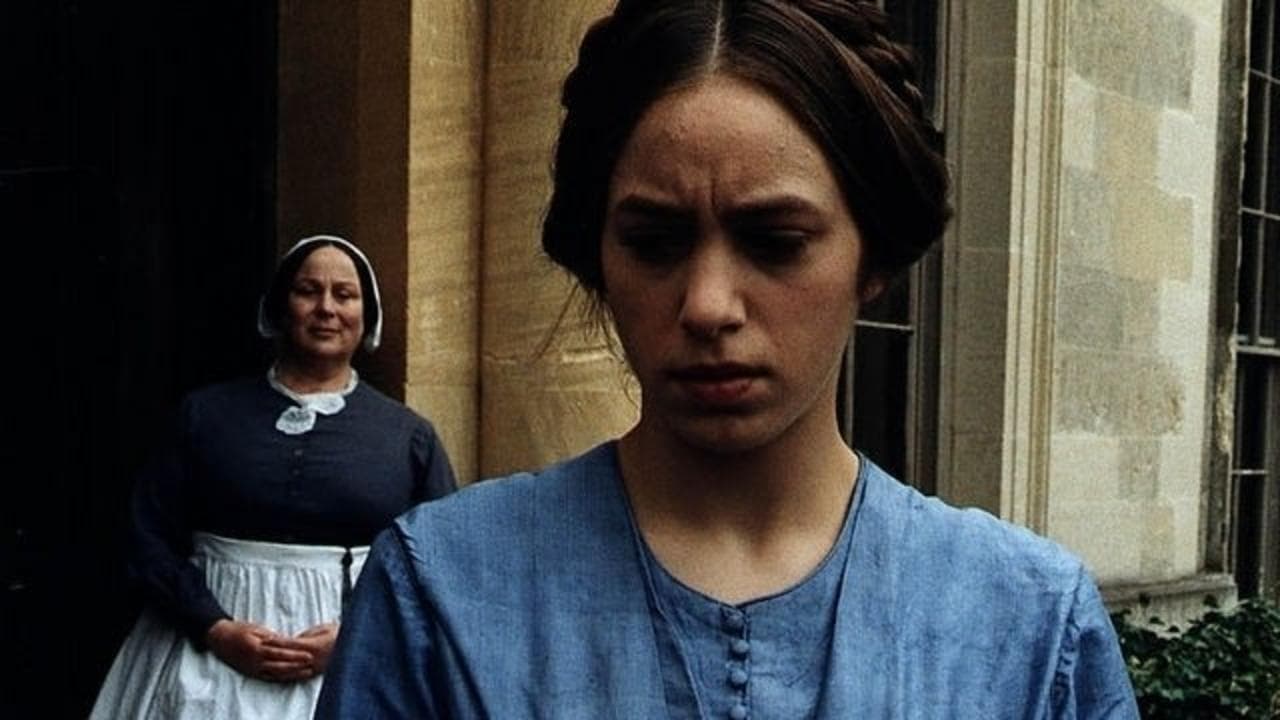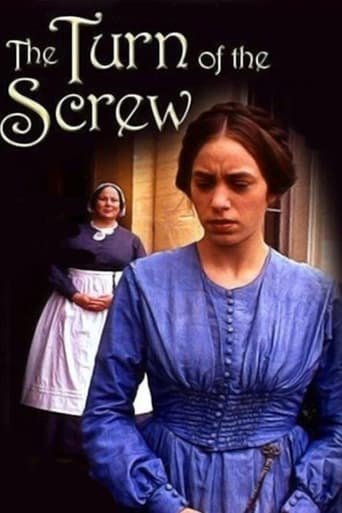Brendon Jones
It’s fine. It's literally the definition of a fine movie. You’ve seen it before, you know every beat and outcome before the characters even do. Only question is how much escapism you’re looking for.
Yash Wade
Close shines in drama with strong language, adult themes.
Sanjeev Waters
A movie that not only functions as a solid scarefest but a razor-sharp satire.
Curt
Watching it is like watching the spectacle of a class clown at their best: you laugh at their jokes, instigate their defiance, and "ooooh" when they get in trouble.
Dr Jacques COULARDEAU
This adaptation is very faithful indeed with the characters, the setting, the various moments of the story, apparitions of the ghosts included. The film is also clear about the parents of the kids, the mother died of yellow fever, we assume in India, and the father died on duty in India too one year late. But the film, like Henry James' novella, does not capture the tremendous trauma the children must have gone through and then – the film is clear about that – Miss Jessel got pregnant which made her have to go, to be let go by the Master. Pregnant from whom? The situation implies from Peter Quint. But the first double trauma of the children is now amplified by a second double trauma with Mis Jessel going away and dying, by suicide as the opening scene shows, closely followed by Peter Quint dying in some kind of accident, fake or not does not matter. And strangely enough only the nameless governess is traumatized by these facts and she is led into seeing ghosts that no one else sees.The film insists on this aspect of the character. She is getting little by little haunted – but in her sole mind – by her two predecessors. The kids are at an age – and their having gone through these two double traumas helps – when they can capture the fears of adults and they can get motivated to play on these fears, for fun or in this case for liberation.The governess becomes a power and control freak and she transforms teaching into taming wild animals if not beasts. She sees them perverted while she is the one who is perverted. The film is discreet on this side of things though Henry James insisted on the governess's hugging, kissing, holding hands, embracing, etc., with Miles particularly. She was obviously falling in love with Miles and wanted to possess him so strongly that he would became part of her own self. She was cannibalistic in her unjustified love for Miles. To love a child is a lot more challenging than to love an adult because the child cannot answer, cannot say no, cannot run away and when Miles tries the governess does not understand. The film insists on that but not on the sentimental, emotional and physical love of the governess towards Miles that is definitely desire and this desire is somewhere felt as wrong, evil is her word, so she has to repress it and the ghosts are her tools to transfer her repressive desire against her perverse impulse onto the object of this pedophile lust, hence onto Miles, and accidentally Flora.She literally tortures the kids with the ghosts, till the very end, though Benjamin Britten does a far better job with that last scene about being alone and how the governess is understanding the ambiguity of the situation on which Miles is playing full blast, and it works. That's what the two kids show us in the film very clearly: they are playing with the governess like two cats and one mouse. She falls in the trap every single time and she ends up being a fool. But that fool is criminal.The film here centers this last scene on the last breath of Miles. He is more or less dragged by the governess into her arms and into an embrace and here the films innovates because the call for "Quint, you devil, Where are you, where are you?" is a call for help when Miles sees his end is close, the praying manta has captured him. But Quint won't be able to come because he is no where, near or far, he is no longer one of them. And the film is clear when it shows the governess embraces Miles to death, till death parts him from his life, and Miles is just plainly choked to death. No ambiguity, no fuzziness. She is a criminal and she was brought there by the size of the responsibility she was entrusted with and she could not cope with and up to. Well done, well directed, well performed, the film is impressive, though in no way frightening. We are horrified by the governess's fall into crime because of her repressed and unaccepted feelings and desires for a boy under her own educational responsibility. She is depicted as a closet pedophile who ends up killing the child she wants to possess, including physically. I am afraid though this takes a lot of mystery from the story without modernizing the vision. Such facts are rare in the concerned world of education, and in fact I just wonder if they are in proportion more important in this world than in the wide society around.Note there is a mistake on the back sleeve of the DVD: the children are not those of the "charming bachelor" because he is only the guardian and they are his nephew and niece. But, well, a child is a child, though exiling one's own "children" to a country house with not contact with their "father" would be more than unnatural – which it is here – but definitely inhumane and even barbaric.Dr Jacques COULARDEAU
MartinHafer
I have recently seen several versions of this tale by Henry James. And, being a glutton for punishment, I thought I'd see a few others so I can compare them (such as "The Innocents" and the 1974 and 1992 versions which bear the original story's title). Now I am NOT saying it's a bad story--it's quite good--but most folks don't want to see and compare the stories like this. I am doing it as a public service and because I am a solid humanitarian (well, maybe not).A governess is hired by an odd man to care for his orphaned nephew and nice. However, he has a bizarre demand--that she never contact him or expect him to have any involvement with the kids! Nice, huh? Well, she travels to one of his homes where the niece lives. The governess is surprised to see that the home is huge and quite gorgeous--and the child a sweet little thing. Life seems ideal at this home.A bit later, the nephew is sent home from his boarding school and the governess is informed he cannot return--but they never disclose in any way why. It's odd, as the boy seems exceptionally well behaved and bright. And, for some time life is swell. However, occasionally, the governess sees people--people no one else seems to see. While you'd assume she's either crazy or overreacting, her descriptions of the two figures are consistent with two members of the staff who are now dead! She assumes she's seeing ghosts--and she assumes the ghost mean to do the children harm. How she comes up with this is unknown--and opens the story up to some interpretation. In this 1999 version, the filmmakers seem to STRONGLY imply that the governess is probably insane and/or suffering from religious delusions. She might seem in this version to be suffering from paranoid schizophrenia or is just very uptight and impressionable--but you aren't sure. This is interesting because in most of the other versions I've seen make it seem as if there really are ghosts and the governess isn't necessarily insane. Either interpretation is possible--as in James' novel this wasn't explicit. And, in the end, what happens to the boy is NOT exactly what happens in other versions. Again, because they seem to be implying the governess is a few fries short of a Happy Meal.This made for TV version has very nice location shooting and music. However, if you are looking to get your fill of Colin Firth (for all you Firth-a-holics), you will be sadly mistaken, as he's ONLY in the opening scene and no more. And, I appreciate it emphasizing an atypical interpretation of the tale, as MANY stories have been done about it--and it's nice to see something a bit different. Well worth seeing--particularly if you are looking for a psychological picture as opposed to a supernatural story.
irish23
I read "Turn of the Screw" over 20 years ago but I recall that it struck me as dead boring. I watched this adaptation in the hopes the story would grow on me over the years. Alas! The film has lovely sets, costumes, and music. It occasionally has decent acting. But overall it can be watched on fast-forward most of the time and not lose anything. Perhaps it relies on the idea that viewers will be so familiar with James' story that dialogue and even (gasp) exposition might be necessary to flesh things out a bit. I learned more from reading the viewer comments here than I did from watching the film.Poor Jodhi May must have drunk gallons of water during filming, since she seems to spend about 50% of her on screen time with eyes bulging and her mouth hanging open. Her descent into madness is believably gradual, but her Victorian ideas of purity and evil seem to leap from nowhere. Her character desperately needed context in order to be more clear.I saw "The Innocents" with Deborah Kerr a few years ago and it was genuinely creepy. This Masterpiece Theatre production lacked Innocents' clarity of narrative and commitment to interpretation. Instead, it wandered through far too many long shots, pan shots, and crane shots across an English country estate. And the ending was completely anti-climactic, with May's emotional level the same as it had been throughout most of the rest of the film, when instead it should have been leaping off the screen.Three stars for pretty pictures and occasional acting; minus seven stars for poor script, vision, and direction.
Cajun-4
This TV production doesn't break any new ground in it's retelling of Henry James ghost story, but it's a nicely handled version all the same.The relatively unknown cast give good performances. Johdi May as the governess has just the right mix of shyness and repression and is attractive without being overly glamorous. The freudian aspects of the story are hinted at but are not overdone.As usual with a Masterpiece Theater production the production is superb and the English country house setting is beautiful.

